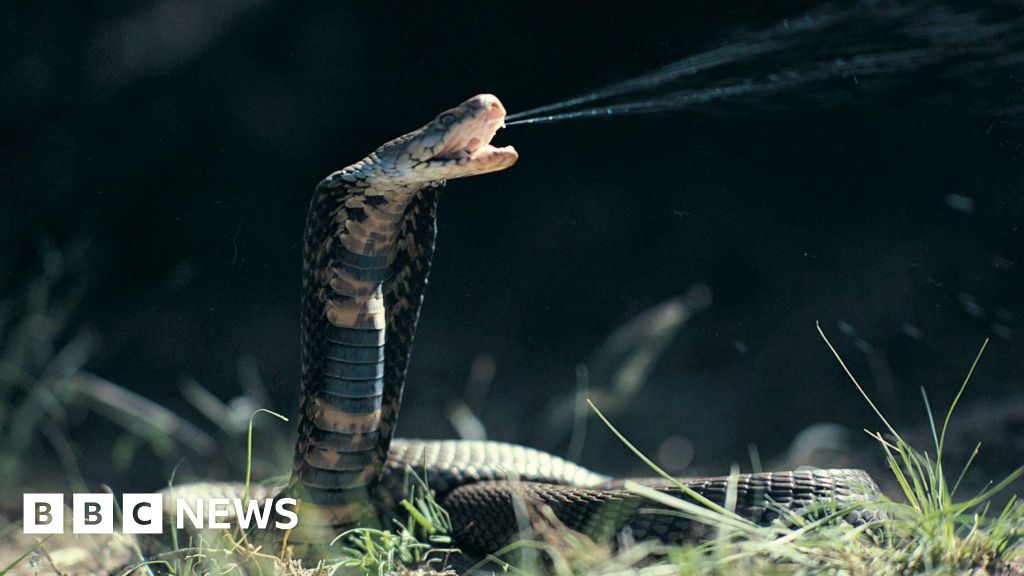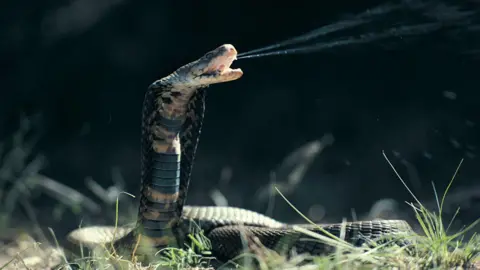Cobra venom neutralised by common blood-thinning drug Heparin

 Getty Images
Getty ImagesA drug commonly prescribed to thin blood can be repurposed as a cheap antidote to cobra venom, a team of scientists based in Australia, Canada, Costa Rica and the UK has discovered.
Snakebites kill about 138,000 people a year, mostly in poorer rural areas in low- and middle-income countries in Africa, South and South East Asia.
More than 400,000 others develop necrosis, when the tissue around the bite dies and turns black.
Cobras account for most bites in parts of Africa and India. And Heparin can neutralise the necrosis-causing toxins in some spitting cobras’ venom.
The drug is not effective against all snake venom – but the scientists say it could be cheaper and more flexible than existing antivenoms, many of which work against only a single snake species and cannot prevent necrosis.
Having already tested the drug on mice, the next step will be human trials.
‘Global fight’
Senior study author Prof Greg Neely, from the University of Sydney, said: “Our discovery could drastically reduce the terrible injuries from necrosis caused by cobra bites – and it might also slow the venom, which could improve survival rates.
“Biological agents like venoms and toxins all require some collaboration from the host side, the human side, so our study was to identify what, in humans, interacts with the venom to create this necrosis and death.
“What we’re finding is when we take different venoms from very different species, there’s a small number of ways they interact with human cells.
“One of the cool things from a science perspective is that we think we can identify four or five different ways that venoms as a whole interact with cells – and then we can make universal antidotes that can block big groups of species.
“We hope that the new cobra antidote we found can assist in the global fight to reduce death and injury from snakebite in some of the world’s poorest communities.”
‘Lifelong disability’
Lead author, PhD student Tian Du, also from the University of Sydney, called it a big step forward.
“Heparin is inexpensive, ubiquitous and a World Health Organization-listed essential medicine,” she said.
“After successful human trials, it could be rolled out relatively quickly to become a cheap, safe and effective drug for treating cobra bites.”
Another of the scientists, Liverpool School of Tropical Medicine Centre for Snakebite Research and Interventions head Prof Nicholas Casewell, said: “Snakebites remain the deadliest of the neglected tropical diseases, with its burden landing overwhelmingly on rural communities in low- and middle-income countries.
“Our findings are exciting because current antivenoms are largely ineffective against severe local envenoming, which involves painful progressive swelling, blistering and/or tissue necrosis around the bite site.
“This can lead to loss of limb function, amputation and lifelong disability.”
Related
Youth football teams hold minute’s silence for 10-year-old Poppy Atkinson
Youth football teams and grassroots clubs across the country have held a minute’s silence at the start of their games to commemorate a 10-year-old girl who di
Girl’s death sparks minute’s silence at football matches nationwide
10-year-old Poppy Atkinson was killed when she was struck by a car during a training session at Kendal Rugby Club in Cumbria. Clubs from Leeds to London
Liverpool fans’ Uefa claim can be heard in England, judge…
The high court, sitting in Liverpool, heard Uefa had relied upon the principle that English courts will not inquire into the legality of actions by foreign gove
Alan Shearer’s Premier League predictions including Manchester United vs Arsenal
Caption: Alan Shearer?s Premier League predictions credit: Getty / Metro After some impressive results for English sides in Europe the focus is












